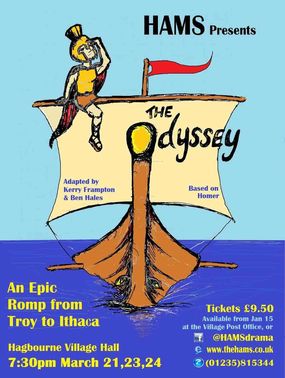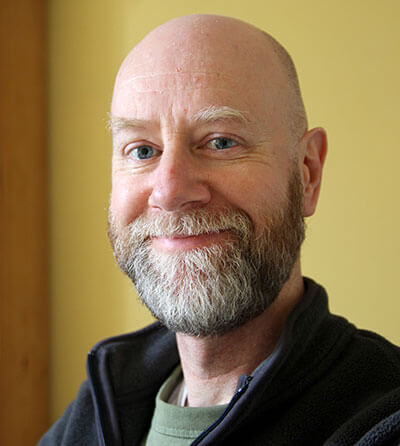|
THE ODYSSEY by Homer, adapted by Kerry Frampton and Ben Hales
HAMS Hagbourne Village Hall, East Hagbourne, nr. Didcot 21, 23 & 24 March 2018 If we are living in an age short on heroes, then there is no comfort to be found in Kerry Frampton's and Ben Hales' comic adaptation of Homer's The Odyssey. Odysseus himself never appears, except as a wooden spoon with a smiley face drawn on it. Not only is it a heroic tale with no hero, it is a mythological tale without any gods. Director Mary Hands highlights this in her programme notes. 'The gods do not feature in this play,' she explains. 'This is significant because the idea of gods controlling people's destiny, or helping them out or punishing them is such a feature of Ancient Greek stories. But not this version.' Frampton's and Hales' intention appears to have been to write a tale in which the idea of deities is deemed irrelevant and in which the notion of heroic men is deconstructed and gently mocked. The female characters, by contrast, are granted a quiet heroic status, and taken absolutely seriously without a whiff of parody. This happens most notably with Odysseus' wife Penelope (a fine, nuanced performance by Liz Holliss of a noble character) and Calypso (Maya Griffiths, convincing as a broken-hearted nymph). Instead of calling on gods and goddesses to help Odysseus and his men, the narrator (the Old Man of the Sea, of which more in a moment) announces a series of obstacles that the men had to overcome. This put me in mind of a self-help book, aimed at getting you to achieve your goals, which was probably not the writers' intention. The original production of this adaptation was written for three women who play all the roles. An enticing prospect for the three lucky women, but not ideal for an amateur theatre group with plenty of willing performers chomping at the bit. HAMS rather sensibly re-adapted the play so that 24 actors could play the 24 parts. They say that good things come in threes, and that was certainly true of HAMS' production, not once, but three times three. Our narrator, the Old Man of the Sea, is played simultaneously by three performers (Andy Stocks, Jemma Craperi and Becca Warrington), identically made up in grey knitted beards with matching beanies, and silver face paint, and talking to themselves ('Yes, myself,' 'Thank you, myself.'). This device worked well and represented the conscious use of a chorus in the Greek tradition. It was a structural and comedic success. Instead of Odysseus we had three of his warriors lead us through each adventurous episode. Their characters were written as bragging yobbos one moment, and abject cowards the next. If Frampton and Hales had spoken to even a couple of servicemen who had seen recent action in Iraq or Afghanistan, then perhaps we would have seen a fairer and more realistic picture of what real men feel in combat situations. As it was, this was mere caricature with, one suspects, a soft political purpose. I said good things came in threes. Notwithstanding my mixed feelings about the writing, we had terrific performances as the warriors from Kelly Stewart, Doug Amos and Martin Redhead. They were a thoroughly energised ensemble that proved to be the anchor of the show. They deserve congratulations. The final threesome that tickled me were Antiphantes, the Giant Chief, and his wife and daughter. Director Mary Hands had them played as reality TV celebs, being interviewed in front of the cameras about how they'd eaten members of Odysseus' crew. It was a comedy tour-de-force by Rob Dew, Jean Elliott and Jane Bell. Polyphemus the Cyclops was played as a sympathetic shepherd by David Cooke, whose costume consisted of a single giant eyeball that obscured the whole of his face. It worked to great comic effect and there was some nice interaction with the audience. His caring relationship with his flock of sheep (Di Duff, Vivien Stocks and Susan Proctor) made for some fine business, and further built up the audience's sympathy for him when he had his eye put out by Odysseus and his men. There were 'aaahs' as he limped off at the end. The fact that he'd provoked this by snacking on Odysseus' warriors seemed almost by the by. This was a production that lent itself to cameo performances, which the actors made the most of. Whether it was Craig Barfoot's Aeolius, King of the Winds, complete with Rod Stewart wig, or Karen Carey's sensuous and voluptuous mistress-cum-sorceress Circe, the hilarious quartet of Penelope's suitors (Yen Rickard, Di Duff, Iain Duff and John Lawson, playing up to the crowd), or Scylla and Charybdis (Muriel Stanley and Richard Elliott with very silly wig and litter pickers, and rubber ring respectively), the audience, and the present writer, enjoyed it enormously. Full marks for the decision to use a very spare set design, which consisted of a black backdrop with a washing line draped across it. From the line were hung banners announcing which aspect of Odysseus' character the current scene depicted. So we had Odysseus the Killer, Odysseus the Powerful Leader, Odysseus the Victim, etc. Flanking the backdrop were paintings of scenes from The Odyssey by Yen Rickard and the Pavilion Painters. There was intelligent use of mood music and songs, including an original song composed by Julian Gallop and Doug Amos, to enhance the drama. There were one or two moments where performers either forgot their lines or jumbled them. However, no prompts were required and those responsible dug themselves out and pushed forward. Phew! Mary Hands should feel quiet satisfaction at having taken something of a gamble over the choice of show and pulled it off. HAMS offered us an entertaining evening that was somewhat different from much amateur theatrical fare and sent their audience away chuckling.
2 Comments
Leave a Reply. |
About the Author
Mike Lord has been involved with amateur theatre for over twenty years, mainly as an actor but also, more recently, as a director. Archives
July 2019
Contact me
Please use the Contact Form for anything apart from comments on blog posts. |


 RSS Feed
RSS Feed
